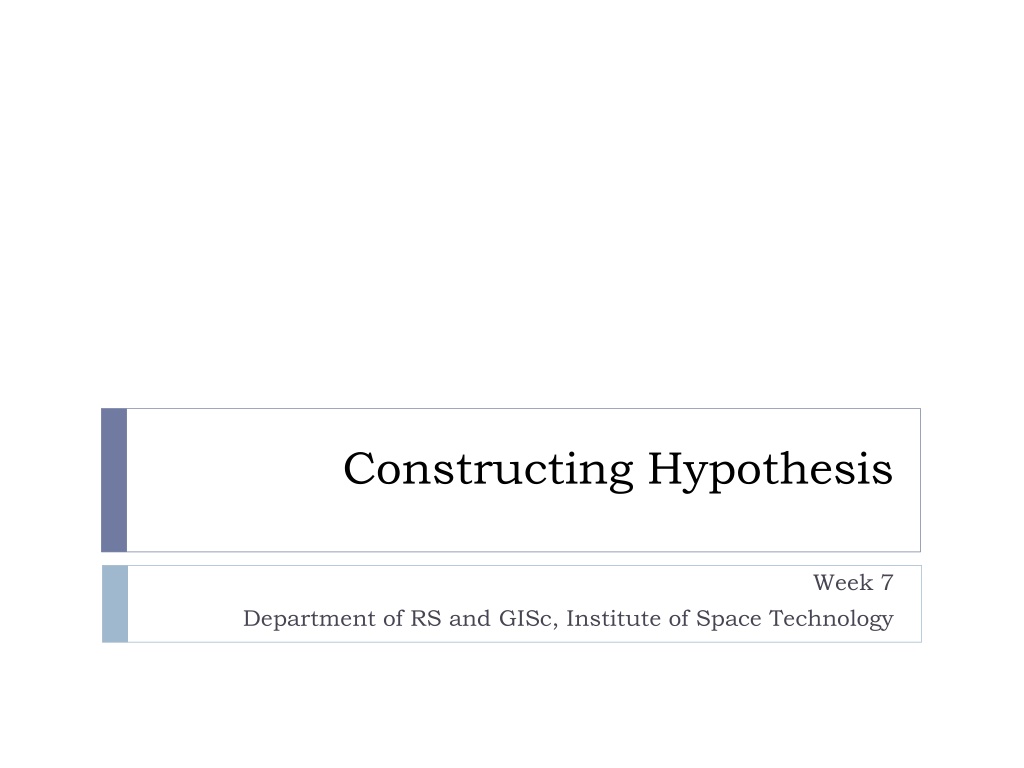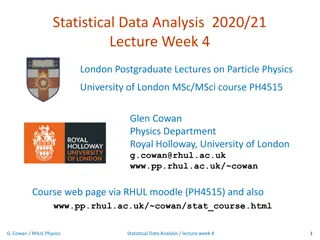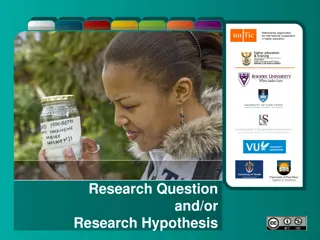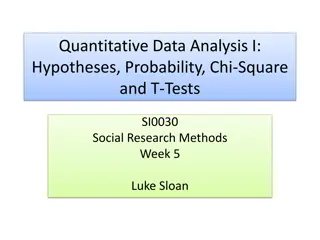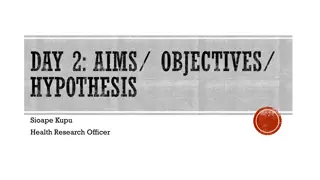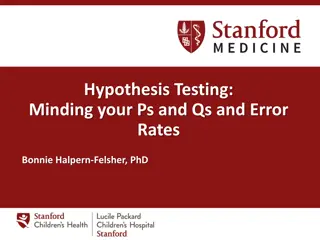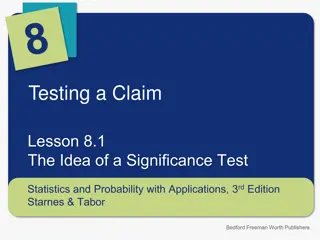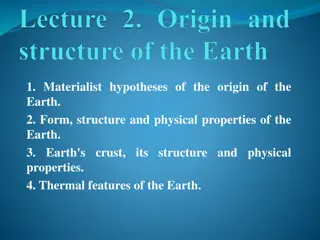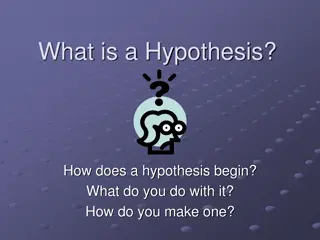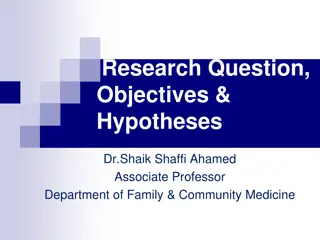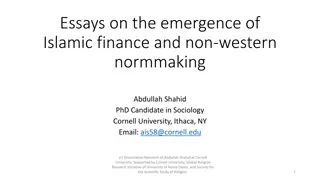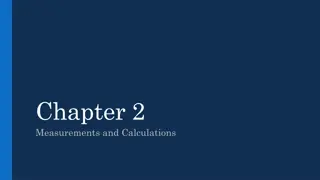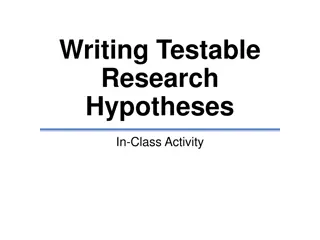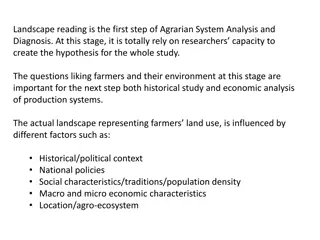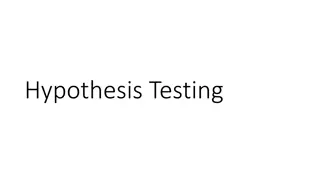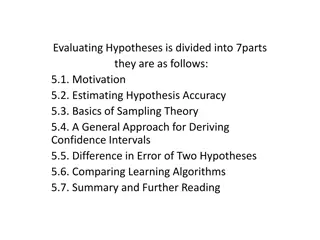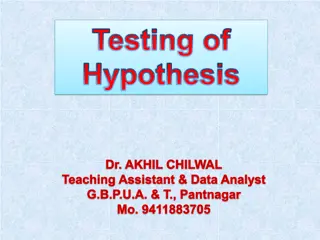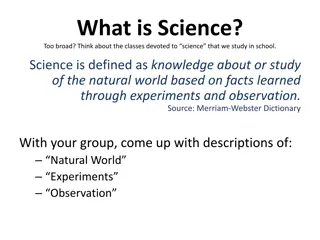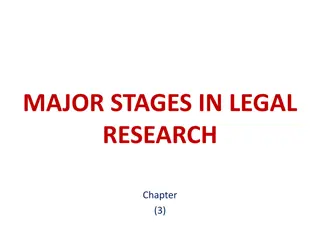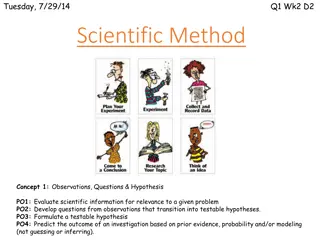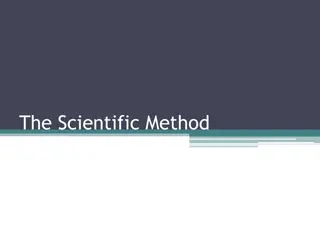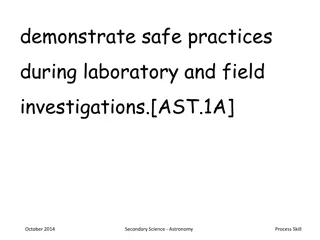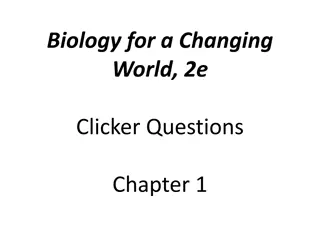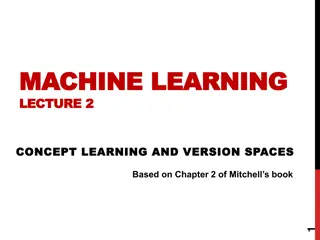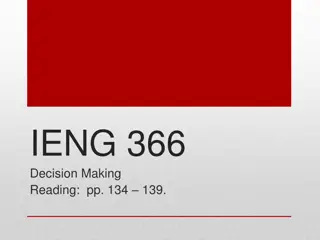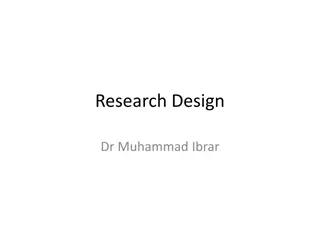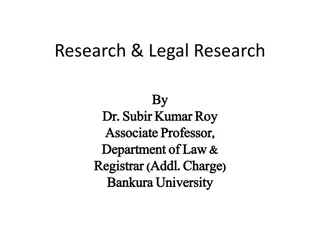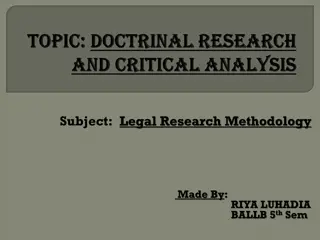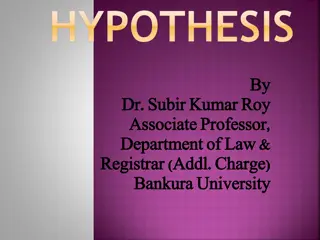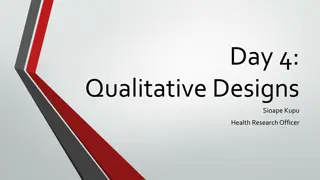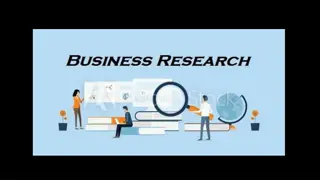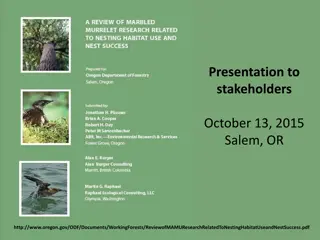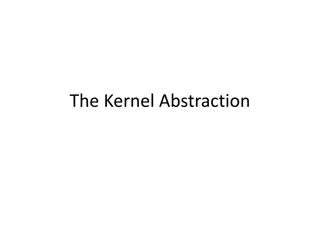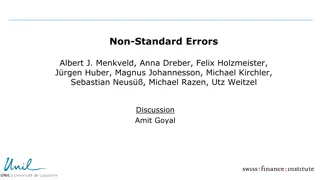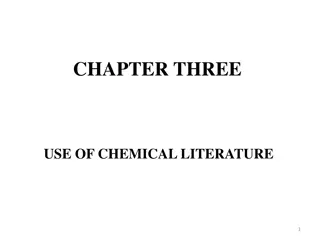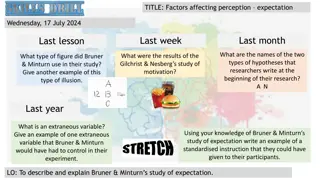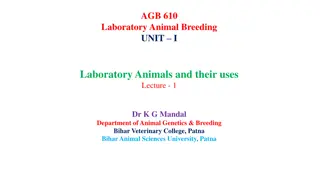Understanding Hypotheses in Research: Importance and Development
Hypotheses play a crucial role in research by providing direction, clarity, and focus to a study. They are educated guesses that guide researchers in testing theories and making predictions about the relationship between variables. Developing a hypothesis involves common-sense reasoning, research modeling, and following a structured paper format to test and evaluate expectations. By understanding the nature of hypotheses and their significance, researchers can effectively drive their inquiries forward and draw meaningful conclusions.
Download Presentation

Please find below an Image/Link to download the presentation.
The content on the website is provided AS IS for your information and personal use only. It may not be sold, licensed, or shared on other websites without obtaining consent from the author. Download presentation by click this link. If you encounter any issues during the download, it is possible that the publisher has removed the file from their server.
E N D
Presentation Transcript
Constructing Hypothesis Week 7 Department of RS and GISc, Institute of Space Technology
What is a Hypothesis? Educated guess/assumption Tentative prediction/preposition Possible outcome Good hunches/speculations Basis of an inquiry!!!!! Example: less smokers in this class than senior class
Why Hypothesis is important? To a research problem it brings Direction Clarity Specificity Focus You may construct many hypotheses within the context of a research Important: Not essential for a study
Hypothesis or Research Question A research question is essentially a hypothesis asked in the form of a question. Indicates question in testable form A null hypothesis must be testable by statistical means. If statistical testing is not possible hypothesis is actually a research question
Developing Hypothesis Common Sense Research Model Paper Format Why? Research Question Intro Your answer? Develop a theory Intro How Identify variables (if Methods applicable) Identify hypotheses Expectations Methods Test hypotheses Collect/analyze data Results Evaluate the results What it means? Conclusions Critical review What it doesn't mean? Conclusion
Hypothesis Definitions A conjectural statement of the relation between two or more variables (Kerlinger, 1986) Tentative prediction about the nature of the relationship/comparison between two or more variables Hypothesis is a formal statement that presents the expected relationship between an independent and dependent variable.(Creswell, 1994) Statement or explanation that is suggested by knowledge or observation but has not yet been proved or disproved (Macleod and Hockey, 1981)
Nature of Hypothesis? Always in declarative sentence form Can be testable, verifiable or falsifiable Not moral or ethical questions Neither too specific not too general Prediction of consequences Considered valuable even if proven false Written in such a way that it can be proven or disproven by valid and reliable data it is in order to obtain these data that we perform our study (Grinnell, 1988)
Characteristics of a Hypothesis? It is a tentative proposition Its validity is unknown In most cases, it specifies a relationship between two or more variables
A hypothesis should be Simple, specific and conceptually clear Unidimensional: only one relationship at a time Examples: The average age of the male students in this class is higher than that of the female students 1. Suicide rates vary inversely with social cohesion 2. Capable of verification Related to existing body of knowledge Operationalizable Expressed in terms that can be measured.
An Example Imagine the following situation: You are a nutritionist working in a zoo, and one of your responsibilities is to develop a menu plan for the group of monkeys. In order to get all the vitamins they need, the monkeys have to be given fresh leaves as part of their diet. Choices you consider include leaves of the following species: (a) A (b) B (c) C (d) D and (e) E. You know that in the wild the monkeys eat mainly B leaves, but you suspect that this could be because they are safe whilst feeding in B trees, whereas eating any of the other species would make them vulnerable to predation. You design an experiment to find out which type of leaf the monkeys actually like best: You offer the monkeys all five types of leaves in equal quantities, and observe what they eat.il There are many different experimental hypotheses you could formulate for the monkey study. For example: When offered all five types of leaves, the monkeys will preferentially feed on B leaves. Does this statement satisfies both criteria (prediction and testable) for experimental hypotheses.? Prediction: It predicts the anticipated outcome of the experiment Testable: Once you have collected and evaluated your data (i.e. observations of what the monkeys eat when all five types of leaves are offered), you know whether or not they ate more B leaves than the other types.
Incorrect hypotheses would include When offered all five types of leaves, the monkeys will preferentially eat the type they like best. This statement certainly sounds predictive, but it does not satisfy the second criterion: there is no way you can test whether it is true once you have the results of your study. Your data will show you whether the monkeys preferred one type of leaf, but not why they preferred it (i.e., they like it best). I would, in fact, regard the above statement as an assumption that is inherent in the design of this experiment, rather than as a hypothesis. When offered all five types of leaves, the monkeys will preferentially eat B leaves because they can eat these safely in their natural habitat. This statement is problematic because its second part ('because they can eat these safely in their natural habitat') also fails to satisfy the criterion of testability. You can tell whether the monkeys preferentially eat baobab leaves, but the results of this experiment cannot tell you why.
In their natural habitat, however monkeys that feed in B trees are less vulnerable to predation than monkeys that feed on A, C, D, or E. This is a perfectly good experimental hypothesis, but not for the experiment described in the question. You could use this hypothesis if you did a study in the wild looking at how many monkeys get killed by predators whilst feeding on the leaves of A, B etc. However, for the experimental feeding study in the zoo it is neither a prediction nor testable. When offered all five types of leaves, which type will the monkeys eat preferentially? This is a question, and questions fail to satisfy criterion #1: They are not predictive statements. Hence, a question is not a hypothesis.
Types Null Hypothesis Ho, HN represents a theory that has been put forward Predicts NO relationship or NO differences Alternate Hypothesis HA , H1 Opposite of Null Hypothesis Non-directional Directional
Examples Null Hypothesis There is no significant difference in the anxiety level of children of High IQ and those of low IQ. Non-directional Hypothesis There is a difference in the anxiety level of the children of high IQ and those of low IQ. Directional Hypothesis Children with high IQ will exhibit more anxiety than children with low IQ
Examples In a clinical trial of a new drug, the null hypothesis might be that the new drug is no better, on average, than the current drug. We would write H0: there is no difference between the two drugs on average. The alternative hypothesis might be that: the new drug has a different effect, on average, compared to that of the current drug. We would write H1: the two drugs have different effects, on average. the new drug is better, on average, than the current drug. We would write H1: the new drug is better than the current drug, on average.
Hypothesis testing Hypothesis tests are procedures for making rational decisions about the reality of effects. The final conclusion of the investigator will either retain a null hypothesis or reject a null hypothesis in favor of a alternative hypothesis. reject H0in favor of H1' or 'do not reject H0 Never conclude: reject H1', or even 'accept H1 Not rejecting Ho does not really mean that Ho is true. There might not be enough evidence against Ho
Testing of a Hypothesis Phase 1 Formulate your assumption Phase II Collect the required data Phase III Analyze data to draw conclusions about its validity Statement: Hypothesis is True or False
Errors in Hypothesis Testing Type 1 error: rejection of a null hypothesis when it is true example: A type I error would occur if we concluded that the two drugs produced different effects when in fact there was no difference between them. Type II error: non-rejection of a null hypothesis when it is false example: A type II error would occur if it were concluded that the two drugs produced the same effect, that is, there is no difference between the two drugs on average, when in fact they produced different ones. A type I error is often considered to be more serious, and therefore more important to avoid, than a type II error.
Hypothesis needs to be structured before the data- gathering and interpretation phase of the research: Gives direction to the collection and interpretation of data Finding the data first and then formulating the hypothesis is like.... throwing the dice first and then betting
